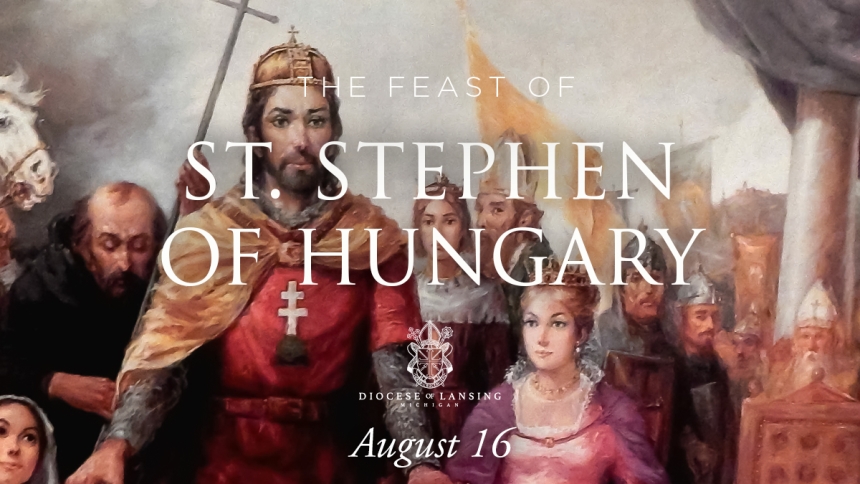
Today is the Feast of Saint Stephen, King of Hungary (969-1038). He was baptized by in about 985AD by Saint Adalbert of Prague who gave him the name of Stephen. King Stephen governed wisely, justly and brought his people to Jesus Christ and His Holy Church. What were the principles of Christian leadership? Michael Andrews, Chancellor of the Diocese of Lansing, now explains. Michael writes:
According to an ancient tradition, before his death, Saint Stephen of Hungary lifted the crown of Hungary, sent to him by the pope for his coronation in the year 1000, to consecrate it and his nation to the Blessed Virgin Mary.
Thereafter, the Holy Crown of Hungary has been considered identical to the Hungarian nation, and without which no sovereign was accepted by the Hungarian people as having lawful authority.
For Saint Stephen of Hungary, the first Christian king of that nation, the responsibility of leadership was entirely bound to the exercise of virtue. In a letter to his son, he directed:
“My dearest son, if you desire to honor the royal crown, I advise, I counsel, I urge you above all things to maintain the Catholic and apostolic faith with such diligence and care that you may be an example for all those placed under you by God and that all the clergy may rightly call you a man of true Christian profession.”
In his letter, Saint Stephen emphasized six key virtues which he believed to be indispensable for Christian leadership:
1. Strength: Rooted in the gift of fortitude, a steady and unwavering firmness in difficulties and dedication to the pursuit of the good, “lest prosperity lift you up too much or adversity cast you down.”
2. Humility: The virtue by which a person knows himself as he truly is. For Saint Stephen of Hungary, this meant keeping focused on eternity, rather than on worldly gain.
3. Restraint: To keep due measure; neither being excessive nor deficient, especially in the punishment of wrongdoers.
4. Meekness: To use self-control in the service of justice; to protect the weak and powerless from the danger implied by one’s own strength and power.
5. Honor: Nobility of character; inspiring excellence; respect and esteem towards others.
6. Decency: To have due regard for one's own moral conduct “so that you may avoid all the foulness of lust like the pangs of death.”
Saint Stephen of Hungary advised his son, and by extension, all of us, to keep “always in your heart the example of the Lord .... Be patient with everyone, not only with the powerful, but also with the weak.” He summarized, “All these virtues I have noted above make up the royal crown.”
Saint Stephen of Hungary, pray for us!
